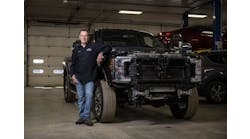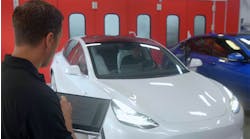In Camille Eber’s opinion, Polaroid’s fade from prominence offers a valuable lesson.
Eber, a successful, longtime body shop owner and a member of Fix Auto USA’s franchise advisory board, can vividly recall when Polaroid was an integral element of the repair process. Early in her career, sending Polaroid pictures to insurers was instrumental in getting reimbursed for supplements.
“When we first got a fax machine, we had little sleeves that we could put Polaroid pictures in,” explains Eber, who owns a pair of Portland, Ore., area shops with CSI scores near 100. “We could fax those Polaroid pictures to insurance companies and prove that we had a broken part. That way, we could get a supplement approved in a matter of a couple days, rather than a couple weeks.”
But Polaroid eventually filed for bankruptcy twice in the early 2000s and, while the company is still in existence, it’s not as powerful as it was at its peak in the late 1970s when it employed over 20,000.
And Eber took note.
“We can learn from Polaroid not adapting,” she says. “In retrospect, they didn’t adapt well to the changing business world. These days, as business owners, we really need to adapt to the way the customer wants to communicate with us.”
The morale of that story is evident throughout the business world at large. To name just one example, Netflix became a disruptive, innovative force in the entertainment industry by willingly reinventing itself, first as a company that mailed customers rental DVDs, and now as a Hollywood power-player that creates acclaimed TV series.
Netflix serves as an example that now, more than ever, businesses need to find a way to meet evolving customer demands—and that’s just as true for collision repair shops as it is for entertainment companies.
In that spirit, here’s a look at some truly disruptive companies—innovators that created a new market and value proposition for consumers—and what body shop operators can learn from them to take their business to the next level.
NETFLIX: THE VALUE OF REINVENTION
Paul Seaborn, an assistant professor at the McIntire School of Commerce at the University of Virginia, has studied Netflix’s success. And the key, he says, has been Netflix’s ability to reinvent itself.
“One of the fascinating things about Netflix is they’ve had to reinvent themselves three or four times,” Seaborn says. “Think back to the early Netflix: it was this idea of getting discs in the mail. And there was a real back-end logistical expertise that they had, about ‘How do we turn things around quickly, where do we locate distribution centers, and all those types of things were very hard for someone else to figure out or replicate. But even still, that model was completely wiped out by the Internet and the ability to stream” video content.
That could’ve been the end of Netflix.
Instead, Seaborn says, Netflix was “willing, at a relatively early stage, to make a bet on online distribution, basically cannibalizing their disc-by-mail business. And that got them a few more years, and eventually that got pretty challenging; people who owned the content started to look at Netflix as more of an enemy than a partner.”
That, however, inspired Netflix’s third, and extremely successful, reincarnation. In 2018 alone, the company hauled in nearly $16 billion in net revenues. This year, the media company boasts 167 million subscribers worldwide, and 60 million within the U.S.
As Portland shop owner Eber alluded to earlier, body shops need to take a cue from successful companies like Netflix and accommodate the evolving desires of today’s consumers.
“We have learned,” Eber says, “that we need to adapt to what the customer wants and not necessarily what we wanted to deliver.”
Seaborn adds that Netflix is “now creating a lot of content and exclusive offerings. Now people subscribe to Netflix because it’s the only place you can get certain series.”
And that, he says, is a powerful example of a company embracing what’s next in customer service, and reinventing itself.
UBER: THE VALUE OF CONVENIENCE
On a recent trip to Las Vegas, Gary Bagwell couldn’t help but notice something at the airport.
More customers than ever were clamoring to use Uber.
“There was a huge line of people waiting for Ubers,” recalls Bagwell, Fix Auto USA’s manager of operations. “Customers had decided they wanted to use Uber, and they weren’t necessarily lining up to use taxis.”
The reasons for Uber’s popularity are rather simple, Bagwell says. When he uses that ride-hailing company he knows in advance what the cost of his ride will be, he knows what time he can expect to arrive at his destination, and he can follow his route online to ensure the driver isn’t roaming around in circles to run up the bill.
In short, Uber—which brought in over $14 billion in revenue in 2019—provides a modernized, pain-free experience for its users.
“It’s those types of experiences that we need to try and implement as best we can into the body shop experience,” Bagwell says. “Because that’s what the consumer’s asking for.”
It’s imperative, in 2020, to give customers what they want, how they want it, and when they want it. Bagwell says that’s why his employer now offers valet pick-up service, for example.
“Make things as convenient as possible, and provide (customers) the level of information that they want, in a forum that’s easy to digest and convenient for them,” says he says.
“You probably wouldn’t want to get a phone call when you’re eating lunch, right?” Bagwell says. “But, if you got a text, you could see it, and recognize what’s being told to you without necessarily interrupting your lunch, people like that now.
“And you have to be able to adapt,” he adds, “to the marketplace.”
AMAZON: THE VALUE OF FORGING RELATIONSHIPS
Nick Egelanian teaches a 16-week, graduate-level business course at the University of Maryland.
He could talk about the virtues of Amazon’s business savvy for far longer than that.
“In the mid-’90s it was just a book company,” Egelanian says of Amazon. “They started out delivering books in a garage. But these guys were dreaming big. They thought on a macro level regarding strategy.”
Egelanian—who also serves as the president of consulting company Siteworks Retail and runs a business advisory board called SWA Affiliates—says Amazon’s emergence illustrates the importance of having a vision as a business owner. That’s what founder Jeff Bezos did with Amazon, and it’s a key reason why he’s currently the richest person on the planet, with a net worth of more than $110 billion.
“Bezos is putting together some of the great executors in the world,” Egelanian says.
Now, he adds, Amazon is deeply embedded in the everyday lives of consumers, who utilize the company for video streaming services, or to utilize a virtual assistant like Alexa. In recent years, Amazon has also become nearly as powerful of an advertiser as Google, due to the vast amount of information it has collected on customers.
“Visionary leaders,” Egelanian says, “look at their businesses and plan ahead for things like that.”
Owners of far smaller businesses, like independent body shops, can still learn from Amazon’s success. For example, Amazon illustrates the value of businesses occasionally utilizing “loss leaders” to secure customers (like delivery, in Amazon’s) case. But, more than anything, Amazon’s emergence proves just how much it can benefit a business to forge relationships with customers.
“Successful businesses, they reduce anxiety for customers,” Egelanian says. “And, the best businesses create an ongoing relationship with their customers.”
INNOVATION, IN SUMMATION
So, how can someone like an independent body shop owner become a disruptive innovator and shake up their market? In the opinion of Farzam Afshar, the CEO of VeriFacts Automotive, it comes down to taking two rather simple steps.
1. Never rest on your laurels.
Afshar subscribes to the theory that a sacred cow is often good for little more than
hamburger. In other words, nothing is sacred in today’s ever-changing world, and past results don’t guarantee future success.
As a result, it’s important to have an open mind and be receptive to change, as well as taking the occasional risk.
“Technology is disrupting everything,” he says. “To be a company that avoids going out of business, go out and taste your own food, but other people’s food, as well, so you can have that perspective.
“Don’t be like Kodak. You know, the guy who created digital cameras worked at Kodak, but they said ‘Get out of here; we don’t make digital cameras.’”
2. Consider ‘yes men’ a no-no.
Yes-men, Afshar notes, are often the enemy of innovation. If you want to be innovative and
alter conventional thinking, it’s imperative to listen to a wide array of opinions. Though it might be gratifying to hear employees agree with your every move, that often limits businesses in the long run.
At VeriFacts, Afshar seeks feedback on his ideas not just from his own employees, but from outside consultants, too. It’s often invaluable, he says, to receive unfiltered feedback.
“There’s a distinction between the people that don’t care,” Afshar says, “and the people who do care but they’re big enough to raise their voice and say ‘You’re wrong, and here’s why you’re wrong.’ And I love the latter group.”




